Key takeaways:
- The sanctity of life prompts deep moral reflections about capital punishment and challenges societal beliefs on justice and redemption.
- The anti-death penalty movement advocates for a humane justice system focused on restorative justice and healing rather than retribution.
- Legal contexts often overlook individual stories behind crimes, reducing human lives to statistics and challenging the balance between accountability and compassion.
- Alternatives to capital punishment, like restorative justice and community service, emphasize rehabilitation and the potential for personal growth, promoting a more humane approach to justice.
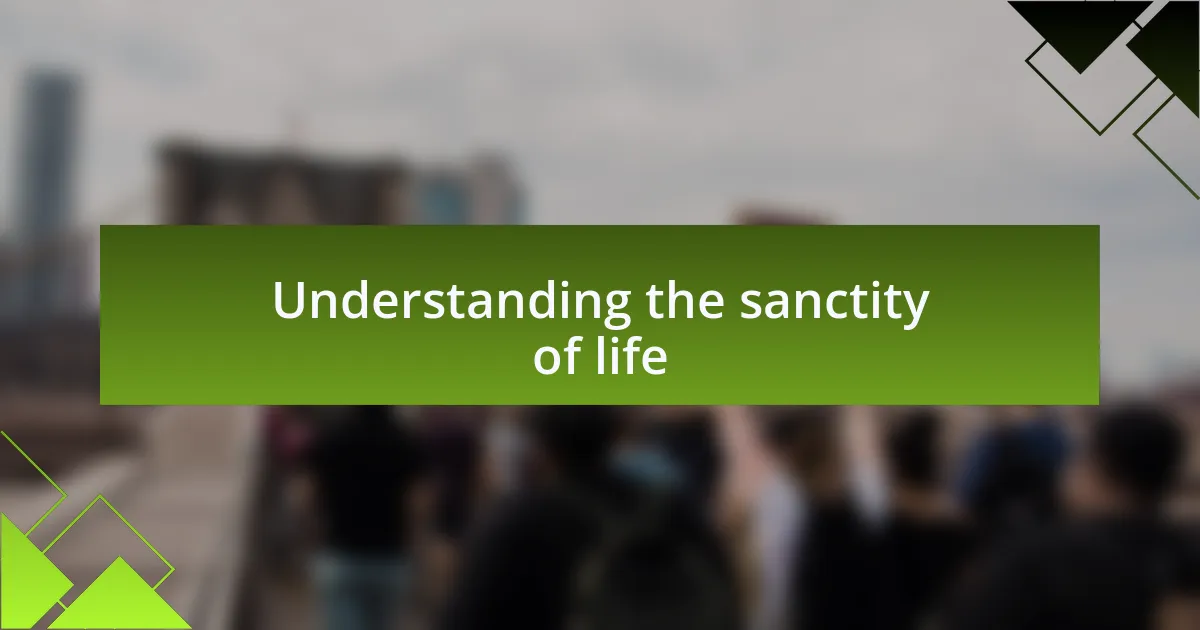
Understanding the sanctity of life
The sanctity of life is a fundamental principle that distinguishes between mere existence and the inherent value of each individual. I often reflect on how, in my own life, I have witnessed moments where the fragility of life became strikingly clear—like the time I comforted a friend who had just lost a loved one, realizing how easily one can be taken from us. It makes me question, what gives one life so much worth while another is deemed unworthy of existence?
When I ponder the sanctity of life, I can’t help but think about the moral implications associated with capital punishment. Each individual life tells a story filled with potential, dreams, and experiences, and I wonder, can we justify snuffing out a story because of a single, grave mistake? This perspective challenges the very notion of punishment and opens up a dialogue about redemption and the value of human life.
Understanding the sanctity of life also compels us to examine our societal values and ethics. I remember a heated discussion in a community group where differing opinions on this issue heightened emotions and challenged our beliefs. It brought home the idea that grappling with the concept of life’s sacredness is not just an intellectual exercise; it becomes a deeply personal endeavor that shapes our convictions about justice and humanity.
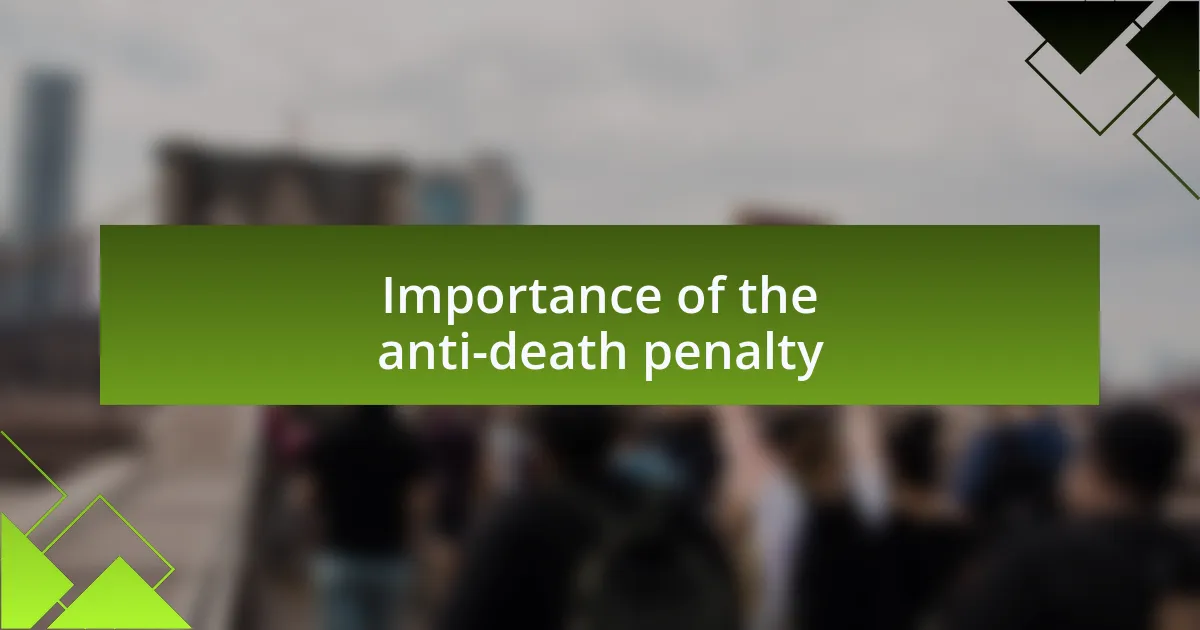
Importance of the anti-death penalty
The importance of the anti-death penalty lies in its challenge to the very foundation of our moral compass. I recall a poignant moment volunteering with a community group that supported families impacted by the judicial system. Hearing the stories of those affected by wrongful executions truly made me question whether we are, in fact, protecting our society by taking a life or if we’re perpetuating a cycle of violence and despair that we claim to oppose.
Moreover, I believe the abolition of the death penalty fosters a more humane justice system. When I reflect on how easily biases can cloud judgment, I can’t help but consider how race, socio-economic status, and mental health can skew the outcomes in capital cases. This glaring inequality signals a serious flaw in a system that should emphasize fairness and justice. Shouldn’t we strive for a society that embraces rehabilitation rather than resorting to ultimate punishment?
Lastly, the anti-death penalty movement encourages us to focus on restorative justice. From my experience, promoting dialogues that emphasize accountability and healing reveals a profound understanding of human dignity. I think about the possibility of turning a tragedy into a chance for growth and understanding. Isn’t that a more powerful legacy than vengeance?
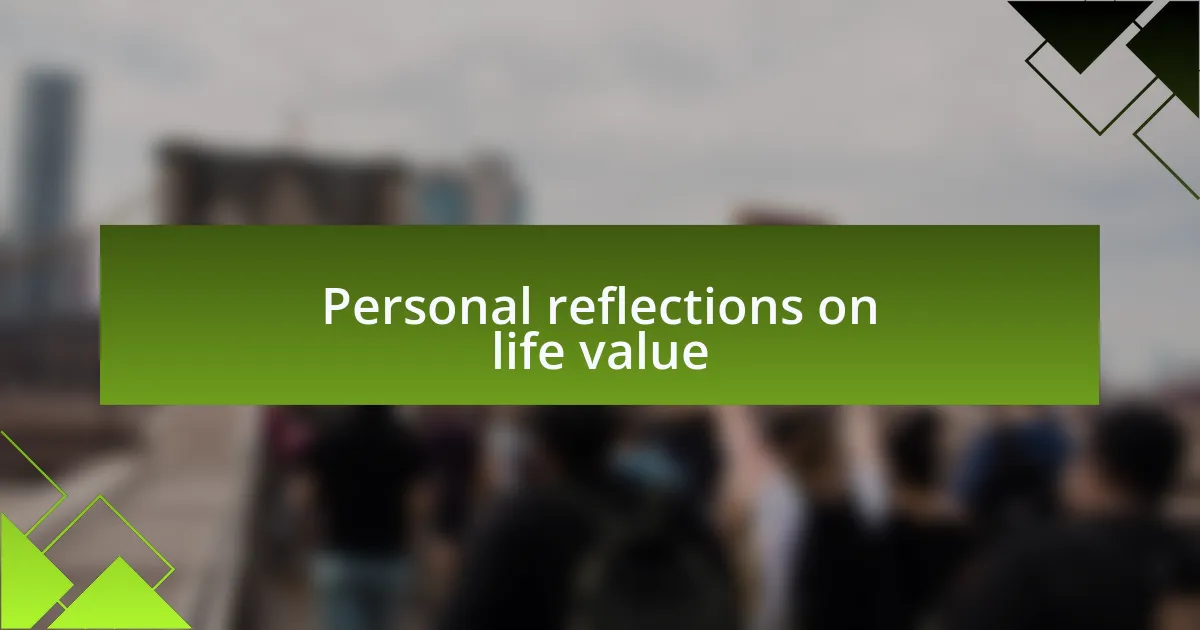
Personal reflections on life value
When I contemplate the value of life, I often think back to a conversation I had with a close friend who lost a loved one to violence. The raw pain in their voice resonated with me, highlighting how every life lost leaves an indelible mark, not just on immediate family but on the entire community. It made me realize that each person carries a unique story, and when we talk about life value, we must remember that our choices can ripple through countless lives.
Reflecting on my own experiences, I recall a moment when I helped a friend navigate the aftermath of a criminal sentence. Watching them struggle with the idea of a loved one being labeled “beyond redemption” made me question the ease with which we dehumanize individuals. Isn’t it crucial to recognize that, regardless of mistakes, every person has the potential for change? The belief in dignity can transform lives; by acknowledging that potential, we affirm the very essence of what it means to be human.
In my view, life should be treated as a sacred tapestry woven from myriad experiences, lessons, and relationships. I often wonder—what are we saying about ourselves when we decide that certain lives hold more value than others? The thread of compassion running through our justice system determines not only individual lives but also the moral fabric of our society. The weight of personal stories and the choices we make challenges me to advocate for a system that sees every life as precious.
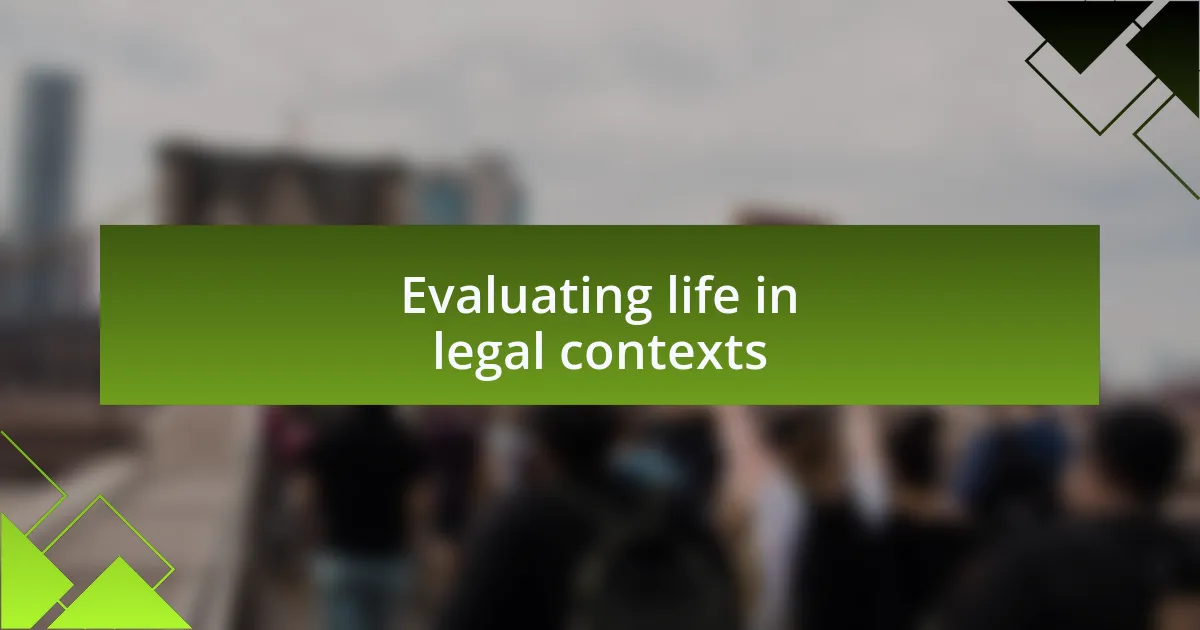
Evaluating life in legal contexts
When I engage with legal cases that involve life and death decisions, I often find myself reflecting on the broader implications of those choices. I remember reading about a case where a young person was sentenced to death for a crime committed in a moment of desperation. It struck me that within the rigid frameworks of law, we often overlook the stories behind the actions, reducing lives to mere statistics. How do we reconcile the law’s need for accountability with the complexities of human behavior?
In legal contexts, the concept of life takes on starkly different meanings. I think about the conversations where lawyers discuss mitigating circumstances, delving into a defendant’s background and experiences. There’s something profoundly unsettling about how easily we can compartmentalize human lives into categories of “criminal” or “victim.” What happens to the nuances of personal history and the potential for rehabilitation in those discussions? It’s crucial to remember that every legal decision carries with it a human life, laden with experiences and emotions.
As I reflect on this, it becomes clear that evaluating life within the justice system demands a delicate balance. I recall a documentary I watched highlighting the voices of families impacted by capital punishment. Each family member spoke with deep emotion, revealing the shared grief not only for their lost loved ones but also for the lives taken by the state. It poses a haunting question: Does the state have the right to extinguish one life in an attempt to validate another? This ongoing conversation compels me to advocate for a justice system that honors the sanctity of all lives involved.
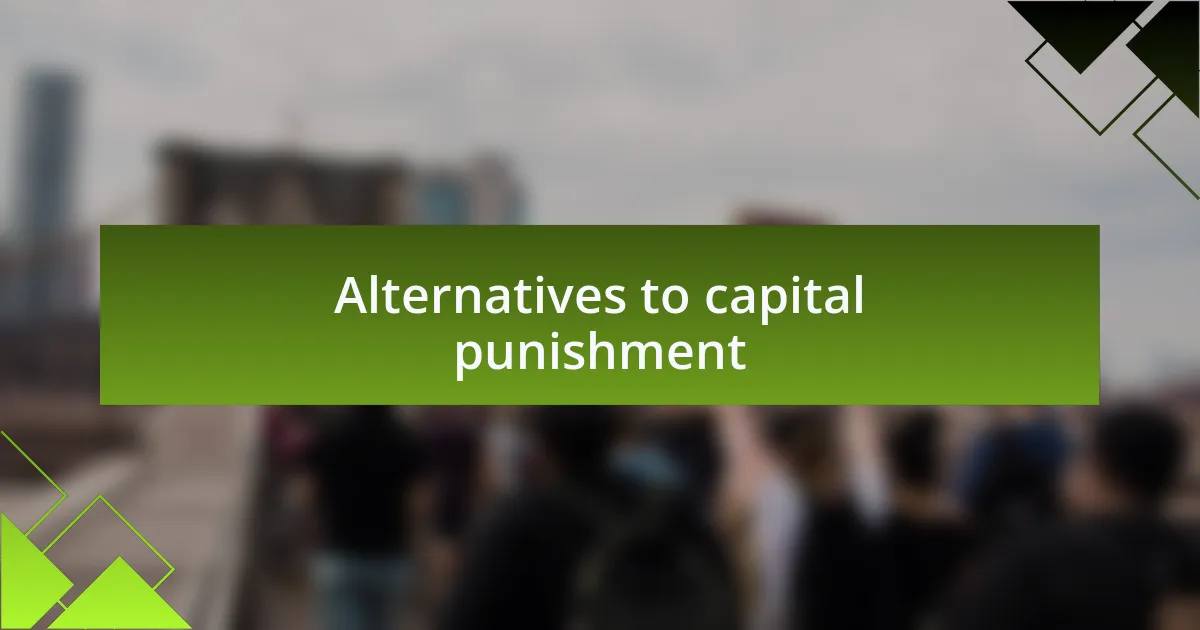
Alternatives to capital punishment
When contemplating alternatives to capital punishment, I’m often drawn to the concept of restorative justice. In my experience, these frameworks prioritize healing over retribution, focusing on repairing the harm caused to victims and communities instead of simply punishing offenders. I once attended a community meeting where a survivor of a violent crime met with the person who had harmed them. Watching that conversation unfold was powerful—it highlighted the potential for understanding and reconciliation, showing that healing can sometimes be more transformative than revenge.
Another alternative that resonates with me is life imprisonment without parole. While this option doesn’t remove the severity of the crime, it offers a chance for reflection and potential rehabilitation, which is something I truly believe can change lives. I’ve seen firsthand how individuals serving long sentences can engage in educational programs and therapy, tapping into their humanity and fostering a desire to contribute positively, even from behind bars. Is it not better to focus on human potential rather than simply extinguishing it?
Additionally, community service as a punitive measure can provide a constructive way for offenders to contribute back to society. I recall a program I learned about where certain offenders worked on community projects, helping to rebuild homes for those in need. It’s a poignant reminder that even those who have erred can find a path toward redemption, showcasing the idea that acknowledging one’s wrongdoing can lead to personal growth and societal benefit. Isn’t this a more humane approach that respects life while holding individuals accountable for their actions?